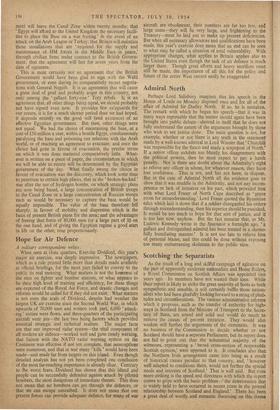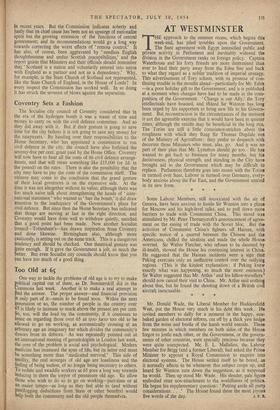Scotching the Separatists
As the result of a long and skilful campaign of agitation on the part of apparently moderate nationalists and, Home Rulers, a Royal Commission on Scottish Affairs was appointed two years ago. Its members have not wasted their time. While their report is likely to strike the great majority of Scots as both sympathetic and sensible, it will certainly baffle those nation- alists who had been gleefully looking forward to a string of plati• tudes and circumlocutions. The various administrative reforms which it proposes, such as the transfer of authority for high• ways in Scotland from the'Minister of Transport to the Secre- tary of State, are sound and solid and would do much to remove the causes of present irritation. They would also weaken still further the arguments of the extremists. It was no business of the Commission to decide whether or not Scotland should have a separate Parliament, but its report does not fail to point out that the substantial majority of the witnesses, representing a broad cross-section of responsible Scottish opinion,' were opposed to it. It concludes also that the Northern Irish arrangement came into being as a result of historical causes peculiar to that country, and, however well adapted to conditions there, would not further the special needs and interests of Scotland.' That is well said. But even more striking is the speed and directness with which the report comes to grips with the basic problem—' the deterioration that is widely held to have occurred in recent years in the general relationship between Scotland and England.' There has been a great deal of woolly and romantic theorising on this theme In recent years. But the Commission indicates soberly and justly that its chief cause has been not an upsurge of nationalist spirit but the growing extension of the functions of central government; and its recommendations would go a long way towards correcting the worst effects of ' remote control.' It has also, of course, been aggravated by ' needless English thoughtlessness and undue Scottish susceptibilities,' and the report ipsists that Ministers and their officials should remember that.' Scotland is a nation and voluntarily entered into union with England as a partner and not as a dependency.' Why. for example, is the State Church of Scotland not represented, like the State Church of England, in the House of Lords? In every respect the Commission has worked well. In so doing it has struck the severest of blows against the separatists.



































 Previous page
Previous page